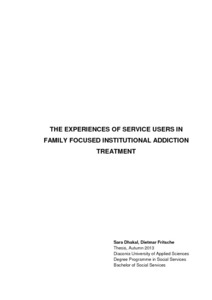The Experiences of Service Users in Family Focused Institutional Addiction Treatment
Fritsche, Dietmar; Dhakal, Sara (2013)
Fritsche, Dietmar
Dhakal, Sara
Diakonia-ammattikorkeakoulu
2013
All rights reserved
Julkaisun pysyvä osoite on
https://urn.fi/URN:NBN:fi:amk-2013092315478
https://urn.fi/URN:NBN:fi:amk-2013092315478
Tiivistelmä
Dhakal, Sara & Fritsche, Dietmar The Experiences of Service Users in Family Focused Institutional Addiction Treatment. 36 pages, 4 appendices. Language: English. Helsinki, Autumn 2013. Diaconia University of Applied Sciences. Degree Programme in Social Services. Degree: Bachelor of Social Services.
The aim of this study was to increase the knowledge about the experiences of service users in family-focused institutional addiction treatment. The research data was collected in a family focused substance abuse rehabilitation facility. Our target group was five service users (parents) in the treatment.
The study is conducted as qualitative research. The research method was semi-structured individual interviews with the service users. We chose this method, because it gave us a chance to gather individual experiences in a discursive, interactive atmosphere. Based on these interviews we conducted a thematic analysis to identify common themes and to structure our findings accordingly.
Our main results show that the service users experience the presence of their family members as a crucial part of their rehabilitation process. They also show that the presence of other service users in similar life situations is experienced as an important aspect of their treatment and is a contributing factor to mutual peer support. The multi-professional expertise of the staff in both family issues as well as substance abuse problems is experienced as another asset within the therapeutic process.
In conclusion, the integration of family members and otherwise close persons into the rehabilitation process should be further increased. Especially children should play a more active role in the process and their perspective should be more acknowledged.
The aim of this study was to increase the knowledge about the experiences of service users in family-focused institutional addiction treatment. The research data was collected in a family focused substance abuse rehabilitation facility. Our target group was five service users (parents) in the treatment.
The study is conducted as qualitative research. The research method was semi-structured individual interviews with the service users. We chose this method, because it gave us a chance to gather individual experiences in a discursive, interactive atmosphere. Based on these interviews we conducted a thematic analysis to identify common themes and to structure our findings accordingly.
Our main results show that the service users experience the presence of their family members as a crucial part of their rehabilitation process. They also show that the presence of other service users in similar life situations is experienced as an important aspect of their treatment and is a contributing factor to mutual peer support. The multi-professional expertise of the staff in both family issues as well as substance abuse problems is experienced as another asset within the therapeutic process.
In conclusion, the integration of family members and otherwise close persons into the rehabilitation process should be further increased. Especially children should play a more active role in the process and their perspective should be more acknowledged.
